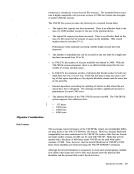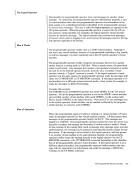PRMDATA= (Used on ACCEPT, CONNECT)
This parameter specifies whether the communicator wishes to allow
messages that contain the message data in the parameter list (for
example, messages sent via the DATA=PRMMSG option).
SpecifyPRMDAT A= YES if you are willing to receive messages via
the DATA=PRMMSG option in your parameter list.
SpecifyPRMDATA=NO if you are not willing to receive messages
sent into your parameter list and only accept messages sent using a
buffer.NO is the default if the PRMDATA parameter is not used.
PRMLIST= (Used onACCEPT, CONNECT, DCLBFR, DESCRIBE PURGE, QUIESCE, RECEIVE, REJECT, REPLY, RESUME,
SEND, SETMASK, SEVER, TESTCMPL)
This parameter identifies theIUCV parameter list, which is input to
the actualIUCV instruction or CALL to DMKIUACP. This
parameter list must be a real address ifCP= YES (invoked from CP system code) or a guest real address (real to the virtual machine) if
invoked from a virtual machine. The parameter list must be on a
doubleword boundary.
Specify either a relocatable label or the number of a register. If a
label is specified, the macro assumes it is the label of the parameter
list. The address of the parameter list is loaded into general register
1 ifCP= YES, or the IUCV instruction is generated to reference the
label ifCP=NO. If a register is specified, the macro assumes it
contains the address of the parameter list; the address is loaded into
general register 1 ifCP= YES, or the IUCV instruction is generated
to reference the register ifCP=NO. This parameter is required for all IUCV functions except QUERY,
and TEST MESSAGE.
IfCP system code issues a SEND or CONNECT, the area specified
on this parameter must be the address of an IXBLOK instead of a
parameter list. See the section,"Invoking Communications
betweenCP and a Virtual Machine" for details. PRMMSG= (Used on SEND, REPLY) PRTY= This parameter specifies the eight bytes of message data that are
moved into the parameter list.
Specify either the relocatable label of the eight bytes of message
data or the number of a register that contains the address of the
data.
(Used onACCEPT, CONNECT, REPLY, SEND)
When you invoke the CONNECT function,PRTY = YES indicates
that you want to establish a path that can handle priority communi-
Inter-User Communications Vehicle 135
This parameter specifies whether the communicator wishes to allow
messages that contain the message data in the parameter list (for
example, messages sent via the DATA=PRMMSG option).
Specify
the DATA=PRMMSG option in your parameter list.
Specify
sent into your parameter list and only accept messages sent using a
buffer.
PRMLIST= (Used on
SEND, SETMASK, SEVER, TESTCMPL)
This parameter identifies the
the actual
parameter list must be a real address if
invoked from a virtual machine. The parameter list must be on a
doubleword boundary.
Specify either a relocatable label or the number of a register. If a
label is specified, the macro assumes it is the label of the parameter
list. The address of the parameter list is loaded into general register
1 if
label if
contains the address of the parameter list; the address is loaded into
general register 1 if
to reference the register if
and TEST MESSAGE.
If
on this parameter must be the address of an IXBLOK instead of a
parameter list. See the section,
between
moved into the parameter list.
Specify either the relocatable label of the eight bytes of message
data or the number of a register that contains the address of the
data.
(Used on
When you invoke the CONNECT function,
that you want to establish a path that can handle priority communi-
Inter-User Communications Vehicle 135



































































































































































































































































































































































































































































































































































































































